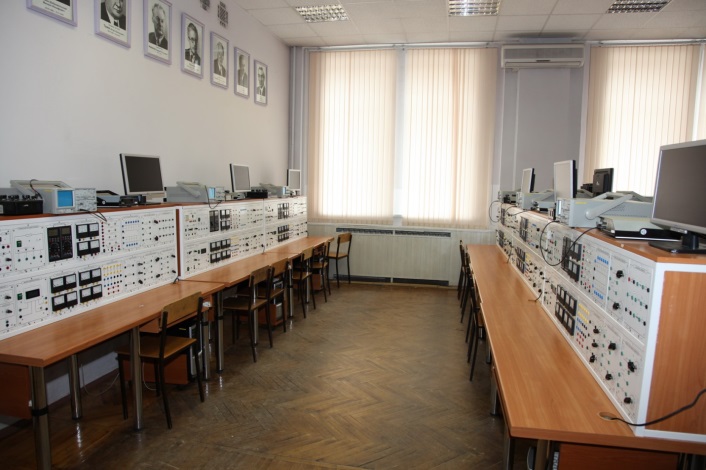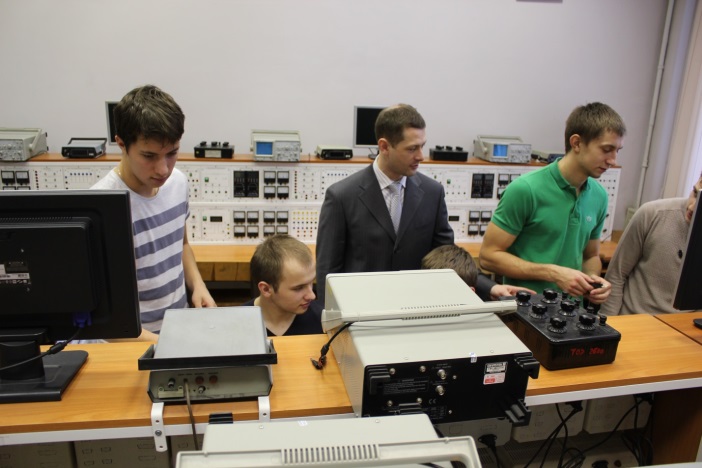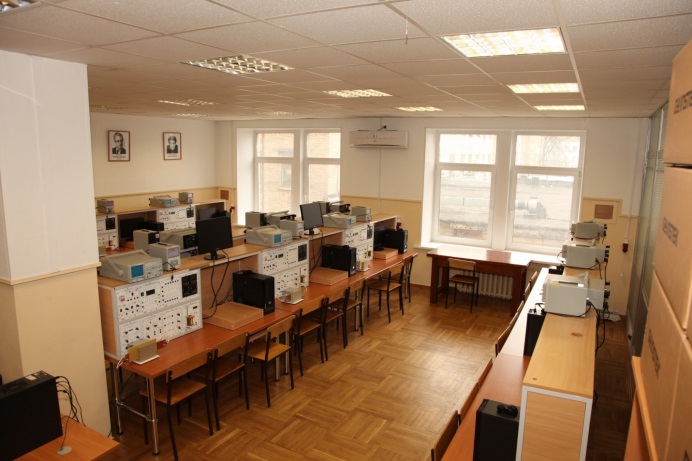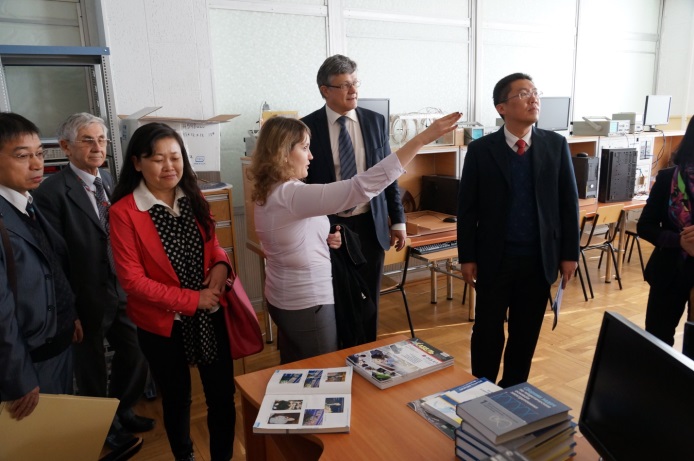Contact
 |
 |
Krasnokazarmennaya 14, З-208, Moscow, 111250,
Russia
|
 |
+7 495 362-77-86
|
 |
ButyrinPA@mpei.ru |
The Department of Theoretical Fundamentals of Electrical Engineering was founded in 1930.
The activity of the department throughout its history was determined by state tasks in the field of fundamental electrical education and science. Our theorists played the most active role in this part of the country's intellectual life.
Summary
Scientific and organizational activities.
The founder of the department, K.A. Krug, was one of the members of the commission who developed in 1920 the first large-scale scientific plan for the development of the national economy of the country, called the state electrification plan of Russia - GOELRO, and coordinating its implementation, as well as the initiator of the creation of MPEI, the All-Union Electrotechnical Institute and a number of other institutions. Academician Demirchyan K.S., as the chairman of the Joint Scientific Council of the Russian Academy of Sciences "Electrical Engineering, Electrical Power Engineering, Electrophysics", oversaw these scientific areas relevant to the development of the country. Now a corresponding member of the RAS P.A. Butyrin being the President of the Academy of Electrotechnical Sciences of the Russian Federation and Deputy Chairman of the Scientific Council of the Russian Academy of Sciences "Electrophysics, Electricity and Electrical Engineering" and the Chairman of the Scientific and Technical Council of PJSC Rosseti, is doing a lot of work to consolidate scientists of the country's electrical engineering and develop a strategy for the development of electrical engineering science and practice.
The staff of the department plays a large role in organizing the electrotechnical press of Russia: Corresponding Member of the RAS Butyrin P.A. - chief editor of the journal "Electricity" and deputy chief editor of the journal "Izvestia RAS. Energy ", Professor Shakirzyanov F.N. is a member of the editorial board of the journal "Electrical Engineering".
The status of a teacher at the department of TFEE MPEI is traditionally considered to be extremely high, and the department itself is a kind of a school for the training of scientific and teaching personnel of the highest qualification. Among the teachers of the department came a whole galaxy of famous leaders of Russian science, technology, higher education. Among them, S.G. Kocharyants: it is necessary to especially label this student of MPEI, graduate student, assistant, senior lecturer, associate professor of the TFEE department, and then the Chief Designer of the Russian Federal Nuclear Center - the All-Russian Research Institute of Experimental Physics, twice Hero of Socialist Labor, Lenin Prize winner and the State Prize USSR winner, holder of the six orders of Lenin and the Order of the October Revolution, Honored Worker of Science and Technology of the USSR, Doctor of Technical Sciences, Professor.
Educational and training activities
The department holds a leading position in the field of fundamental education:
- the department developed GOST R52002-2003 "Electrical Engineering. Terms and definitions of basic concepts ", which has been used by all electrical engineers and electrical power engineers in educational, scientific and practical activities;
- TFEE published the main textbook "Theoretical Fundamentals of Electrical Engineering" in 3 volumes for universities (2003) edited by academician Demirchyan K.S.;
- Corresponding Member of RAS Butyrin P.A. in 2019 published the textbook "Theoretical Fundamentals of Electrical Engineering, Part III";
- a textbook for secondary educational institutions "Electrical Engineering" by Butyrin P.A., Shakirzyanov F.N., Tolcheev O.V. withstood more than 15 editions.
Butyrin P.A. together with doctors of sciences Andreev A.L. and Gorokhov V.G. published the first textbook in Russia, "Sociology of Technology" in 2008, which, in particular, explores the relationship between the development of electrical engineering and society.
The department currently employs 5 professors: academician Demirchyan K.S., corresponding member Butyrin P.A., as well as Alekseychik L.V., Gusev G.G., Shakirzyanov F.N., providing a high level of teaching at TFEE. The confirmation of this level is the successful performance of students at the Moscow Olympic Games in TFEE, which in recent years has been held within the support of CIGRE. For almost 50 years of the existence of this Olympiad, the MPEI team was often a winner or a medalist of the contest.
Research areas
The department develops a number of fundamental directions in the development of electrical engineering, and these are the main directions of research of the department:
- Fundamentals of electromagnetic field theory (RAS academician Demirchyan K. S.);
- The impact of energy on the global climate and prospects for the development of the electric power industry and electrical engineering (academician of the RAS Demirchyan K. S.);
- Sociology and philosophy of science and technology: electrical aspects (member - correspondent of the RAS Butyrin P. A.);
- Electrodynamics of gigantic energies (prof. Shakirzyanov F. N.);
- Superconducting vibrational and antenna systems (prof. Gusev G. G., prof. Shakirzyanov F. N.);
- Diagnostics of electrical circuits and electrical devices (RAS academician Demirchyan K. S., corresponding member of the RAS Butyrin P. A., doctor of technical sciences, professor Alpatov M. E., candidate of technical sciences, associate professor Vaskovskaya T. A.);
- Intellectualization of electrical and electric power devices and systems and their management (Academician of the RAS Demirchyan K. S., Corresponding Member of the RAS Butyrin P. A., Doctor of Technical Sciences, Associate Professor Vaskovskaya T. A.);
- Microwave electrical engineering and electromagnetic compatibility (prof. Alekseychik L. V., prof. Shakirzyanov F. N.);
- Modelling of electrical devices and systems (Academician of the RAS Demirchyan K. S., Corresponding Member of the RAS Butyrin P. A., Doctor of Technical Sciences Vaskovskaya T. A.);
- Optimization of the modes of electric power systems in market conditions (Doctor of Technical Sciences Vaskovskaya T. A.).
Features of the organization of scientific activity at the department are determined by its members, who are also the members of the Russian Academy of Sciences - Academician Demirchyan K. S. and corresponding member of the RAS Butyrin P. A., as well as members of the Academy of Electrotechnical Sciences of the Russian Federation - professors Alekseychik L. V., Gusev G. G., Shakirzyanov F. N., who are primarily concerned with the fundamental problems of theoretical electrical engineering, working with other employees and even students of the TFEE department to solve these problems.
Recent projects implemented by the department
2019 Research work under the grant of the Russian Foundation for Basic Research No. 119-08-00730 A "Optimization of current-limiting and filter-compensating devices based on a new element of electrical engineering performance criteria, reliability and energy efficiency. " Topic number in FSBEI National Research University "Moscow Power Engineering Institute"- No. 3005190. Performer
2019 Research work on the grant of the Russian Foundation for Basic Research No. 17-20-03151 Ofi m_RZHD "Development of the theory of creating mobile multi-channel optical and thermal imaging systems around the clock, all-weather supervision and control with increased detection range for ensure the safety of rolling stock and other facilities of the railway transport ". Topic number in FSBEI of National Research University "Moscow Power Engineering Institute"- - No. 3017170. State number. R&D registration - AAAA-A17-117052310063-7.
Unique equipment
The laboratory complex of the Department of TFEE is one of the best in the world. It consists of:
- The Krug K. A. Educational laboratory of the Theory of electrical circuits (UL TPP, room 3-105);
- Training and Research Laboratory of Theory of Electromagnetic Field (UIL TEMP, room 3-205 and room 3-205a);
- Educational Research Laboratory of Virtual Instruments of Electrical Engineering (UIL RES, room 4-402).


EL TEC was created by Professor Krug K. A. himself in 1947 and allowed laboratory work to be carried out using the frontal method at 24 stands simultaneously in two academic groups throughout the semester. The second generation of equipment of the EL TEC was created in 1972 under the guidance of the head of the department, prof. Ionkin P. A. The third generation of laboratory equipment at EL TEC was created in 2008 under the guidance of the Head of the department prof. Butyrin P. A. and prof. Shakirzyanov F. N. It consists of 24 identical computerized laboratory stands, equipped with digital and analog measuring instruments, two-channel oscilloscopes with a wide frequency range. The stands were developed by MPEI in conjunction with the Scientific and Production Enterprise "Educational Equipment - Profi" (Chelyabinsk). By their configuration, they are unique and are used to organize the front-end execution of 25 laboratory works in I and II parts of the TFEE course. It should be noted that for these parts of the course, 12 to 14 papers are sufficient. The advanced features of the stands allow to choose these 12 - 14 works from 25, taking into account the characteristics of different educational areas and specialities. The stands allow the students and the Department’s staff to perform physical and virtual experiments. The PC of each stand is also used as a computerized measuring complex. An interactive whiteboard is installed in the laboratory, which allows conducting educational colloquiums, educational research seminars, etc.


TRL TEF was equipped in 2011 under the guidance of professors Butyrin P.A. and Shakirzyanov F.N., with new equipment developed by the Department of TFEE MPEI in conjunction with the RPE "Teaching Equipment - Profi". The laboratory has 24 identical laboratory benches equipped with units for performing physical experiments and a personal computer for modeling electromagnetic fields using simple programs that implement the finite element method, as well as the modern Ansys software package, the research version of which is installed on the laboratory server and four workstations for professors. University versions of the Ansys and Elcut programmes are installed on student workstations. The stands allow you to organize front-end laboratory work for part III of the TFEE course. In addition to training equipment, TRL TEF is equipped with unique research equipment: modern panoramic vector analyzers and panoramic measuring instruments from 0 to 40 GHz, a setup for waveguide measurement of complex magnetic and dielectric constants of electrical materials, a cryogenic setup for studying the current-voltage characteristics of superconductors during normal and tangential magnetization, and so on. TRL TEF is also equipped with an interactive whiteboard.